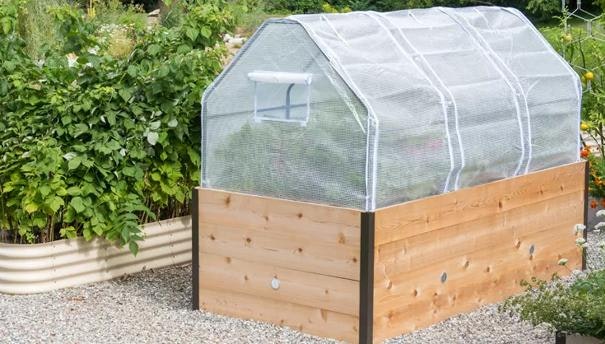If you think a potato is just a potato, think again. You know how the inhabitants of some regions in the frozen North have dozens of different words for snow depending on its texture, etc.? We could well do the same for potatoes. Starchy, waxy, fluffy, moist, dry, creamy, mealy, floury — all are commonly used to describe potato flesh.
There are dozens, if not hundreds, of potato varieties; they vary in texture and behave differently when cooked. If you make a pot of soup and toss in some potato chunks, one of two things happens: The potatoes chunks remain intact, or they disintegrate. The difference is due to the type of starch and the amount of moisture in the flesh — two characteristics that are used to categorize potato varieties. The potatoes that remain intact are of the "moist, waxy" variety; the ones that fall apart are in the "dry, mealy" category. For detailed information on the two types of potato starch and how it affects texture, read The Best Cooking Techniques for Potatoes.
Here we'll look at some categories of potatoes, where the varieties we sell fit in, and provide some insight into what you can expect in the kitchen.
 Butte Russet Potatoes
Butte Russet Potatoes
- Russets Characterized by their rough brown skin and white flesh, varieties such as Butte fall into the dry/mealy end of the texture spectrum. When baked, the thick skin crisps up to create a perfect "jacket" for the fluffy interior. They're easy to mash and ideal for frying and roasting. However, they'll disintegrate in soups and stews.
 Elba
Elba
-
White Potatoes
Compared to russets, white potatoes, such as Onaway and Elba have smoother, thinner and lighter-colored skin. Considered all-purpose potatoes, they are creamy when baked yet hold their texture when boiled. If you don't know what potatoes to use in a recipe, you'll be safe with white potatoes.
 Yukon Gold
Yukon Gold
- Waxy Potatoes Made familiar by the popular Yukon Gold variety, these potatoes have fine-grained, dense flesh that holds its shape when cooked. They're ideal for potato salad, soups and stews, but can also be roasted and baked. Carola potatoes also fall into this category.
-
Colorful Potatoes
Potatoes with red/pink or purple/blue flesh are as easy to grow in your garden as any other potato and, if you ask me, way more fun to harvest, cook and eat. All-Blue has dark, purple-blue skin and lighter blue flesh. It is somewhat mealy, making it good for baking. All-Blues keep their color best when baked, microwaved or fried; when boiled, the flesh fades to a grayish blue. Some people think it has a subtle nutty flavor. Cranberry Red, also known as All-Red, has red skin and pink flesh (sometimes swirled with white) with a dense texture that holds its shape, making it ideal for boiling and sauteing. Red Cloud is a red-skinned potato with dry, white flesh that's perfect for baking.
 Russian Banana
Russian Banana- Fingerling Potatoes Like the name implies, fingerling potatoes, such as Russian Banana, are shaped like fingers — small and elongated. They have thin, tender skin (thankfully, because they'd be difficult to peel) and are fantastic roasted. Because they're so small, you can boil them whole, skin intact, so they don't absorb as much water as potato chunks, making them great for potato salad, too.
 Red Cloud
Red Cloud
- New Potatoes Immature potatoes that are harvested in early summer before they are fully mature (before the vines die back) are called "new potatoes." They can be any variety. Their skin is thin and tender, and they're often boiled whole and tossed with butter and fresh parsley. They have a shorter shelf life than mature potatoes.
Match Cooking Technique to Potato Type
 Baked russet potatoes have crisp skin and a fluffy interior.
Baked russet potatoes have crisp skin and a fluffy interior.Baked: Russets are the classic for baking, although any potato can be baked.
Chowder: Use waxy potatoes in chowder because they'll keep their shape.
French fries: Most fries are made with russets.
 Yukon Gold potatoes keep their shape when boiled and the yellow flesh looks buttery.
Yukon Gold potatoes keep their shape when boiled and the yellow flesh looks buttery.
Hash browns: Russets hold together better than waxy varieties.
Mashed: Russets make the fluffiest mashed potatoes, but any variety can be mashed.
Potato pancakes/latkes: Russets hold together better than waxy types.
 Toss fingerling potatoes with olive oil and salt and roast for an easy side dish.
Toss fingerling potatoes with olive oil and salt and roast for an easy side dish.Potato salad: Waxy varieties and fingerlings are best because they don't fall apart.
Scalloped potatoes: Waxy varieties hold their shape and have a pleasing texture.
Did You Know?
- A daily diet consisting of eight pounds of potatoes and one gallon of vitamin D-fortified milk supplies all the calories and nutrients the average human body needs, with the exception of the mineral molybdenum.
- Potatoes exposed to bright light will turn green; the green area contains solanine, which can cause cramps, headache, diarrhea, and fever if ingested in large quantities. Simply cut away any discolored areas and the rest of the potato is completely safe to eat. There have been no reported cases of potato-related solanine poisoning in the U.S. in at least the last 50 years.
- The average American consumes about 126 pounds of potatoes each year. Out of those 126 pounds, only 44 pounds are purchased fresh; the rest are frozen, dehydrated or in a snack food, like chips. For comparison, the average person in Belarus consumes almost 400 pounds of potatoes each year, the highest annual per capita consumption in the world.
- One medium-sized, unadorned, skin-on potato contains just 110 calories per serving, has more potassium than a banana, provides almost half the daily value of vitamin C and contains no fat, sodium or cholesterol.
- Although placing uncooked peeled potatoes in cold water prevents discoloration, it also leaches water-soluble nutrients and can lead to a soggy final dish.
- What we call potato chips, the British call potato crisps. What we call French fries, they call chips, as in fish and chips.
- Don't refrigerate potatoes; doing so causes some of the starches to convert to sugars, giving them an odd flavor.
- Yellow-fleshed potatoes contain more vitamin C than white fleshed potatoes. Blue potatoes contain anthocyanin, thought to be an antioxidant.
- 2008 was the International Year of the Potato.
- Some vodkas are made from potatoes.
Sources: U.S. Department of Agriculture, Wikipedia, and the Cecil Adams/The Straight Dope.







